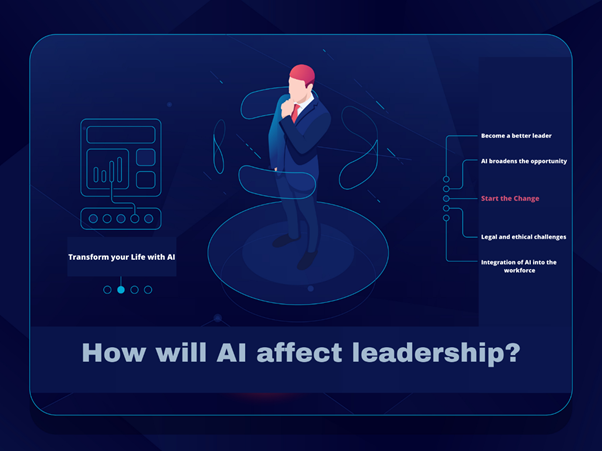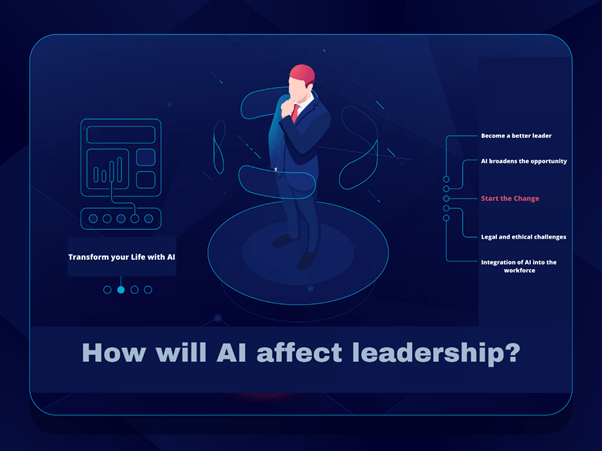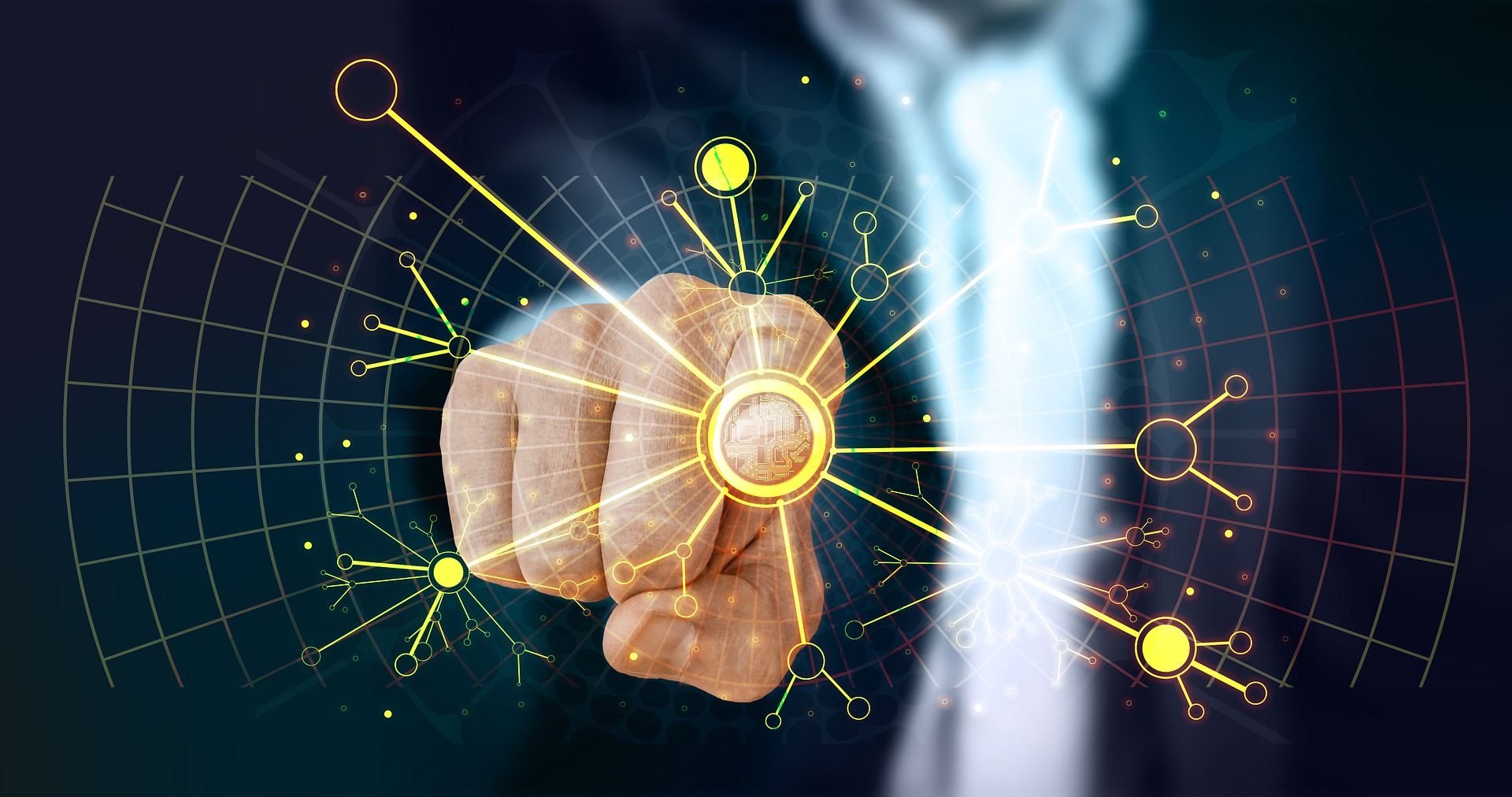How will AI affect leadership?
Apr 22, 2021

A modern associate, the AI system, is probably part of a potential artificial intelligence position of leadership. The growing number of elderly persons shows the need for substitutes to a conventional workforce. Without representatives, robots are usually not working. This new role is intended to allow AI leaders to take part in processes to lead the programmers and affect the research methodology or decision taken by the post-programming AI machines. For all human and computer participants, communication criteria should be set. It is not clear if this new job is called leadership and management, but guidelines for the proper oversight of such devices should be in place.
Since artificial intelligence is more entrenched in our daily work lives, the footprint is now evident in many of our professionals and fields of machine learning, simulation, algorithms, and robotics. However, these technical changes became more apparent as we concentrate at the higher levels of leadership and management, with executives at the C level continually guiding and strategizing as they did.
We are approaching an age of serious artificial intelligence (AI) at the executive level leadership. We are planning ourselves for a world in which people and machinery can cooperate and work in harmony. The exact effect of IA leadership on organizations is too early to determine. In essence, however, AI can increase human choice by making the board of directors more complex and unbiased data processing than possible otherwise. At the same time, human imagination and ingenuity need to be valued.
Stephen Hawking once said, ‘The real risk with AI isn’t malice but competence.’ He encouraged business leaders to follow AI intentionally and prudently but to welcome future reforms. The industry field is now immersed in AI and has raised the barrier for innovative and more accurate operating methods in many cases. Isn't it enough to imagine AI in a leadership sense being discussed?
How can Artificial Intelligence help in becoming a better leader?
A significant issue for the future of work is how we plan to take on more of our positions with artificial intelligence. We should also be willing to examine the beneficial aspects of the technology. AI’s power will improve many facets of jobs significantly. One such factor would be leadership. The strength of AI ultimately depends on its capacity to reduce the volatility as leaders forecast.
From a leadership standpoint, AI will take general questions, have data-based responses, identify focus areas, and generate feasible solutions. For example, teaching algorithms on a range of data sources, from finance to internal communications, will address a broad question for the data analysis team about productivity. You may recognize and perceive patterns and trends which are usually invisible to the human eye.
The AI team follows a course and does not use a destination to achieve outcomes and replies that are not influenced by personal convictions or distinctions concerning the business. That involves whole new solutions. The AI technologies will see if the coordination ratios between teams are inadequate or if teams take too long on specific tasks. With this experience, leaders will decide to contribute to more cohesive teams and a better business.
Importantly, AI provides its analytical feedback loop that enables continuous testing of AI solutions. AI is here to strengthen leadership without a doubt. However, it may change its essence in this respect—specific leadership skills, such as domain experience, decision-making, and authority, which become increasingly needed. Qualities like modesty, vision, adaptability and ongoing commitment in human leadership should be admired further.
In reality, meta-analytic analyses already indicate that personality characteristics such as enthusiasm, emotional maturity, and extraversion have double the importance of the IQ in predicting the efficacy of leadership. As such, we will see leadership positions much more "humane" in the future and work collaboratively with AI programs to find solutions and make them work smoothly and efficiently.
AI broadens the opportunity.
Human beings can bring a creative flair to decision-making and business leadership, emotional intelligence, corporate knowledge, critical reasoning, ethical judgment. However, the human brain has limits and inherent biases, which AI can offset with a hardcore study.
In recruitment, AI may help address problems such as implicit bias, specifically at the senior level, that have influenced decision-making before and have proven to be slow to eliminate. AI will utilize data analytics for recruitment strategy to ensure diversity and balance and ensure that applicants have equal opportunities irrespective of ethnicity, age, ethnic origins, and location.
Ultimately, AI gives companies concrete facts, future results, and forecasts to make better informed, well-considered, unemotional, and intelligent manner.
Legal and ethical challenges
All this raises concerns about AI privileges in the managerial roles versus humans, particularly as far as end-user license agreements are concerned. For example, would legal rights be the same? Businesses are willing to think differently and reconsider current assumptions of potential clients and contract terms while a bot is negotiating.
The legal context of AI is still in its development, and it is ambiguous how it will be handled in the future. For instance, who is responsible for a bot's definitive decision? There is the need for solid guidance on ethical algorithms as well as internal corporate practices in some industries that can take over legal ramifications faster than in others.
Integration of AI into the workforce
Nearly 50 % of respondents believe that the accuracy and effectiveness of the comparable human operation in their AI organizations are far exceeded; it is apparent that AI already meets human skills in many fields.
More than 69 percent of C-level executive staff reporting their workers worried that AI technology would replace them, corporate leaders are aware of potential ethnic and human-made dilemmas in AI. In order to completely incorporate workers into an effective AI operation, organizations must use AI to increase current staff competencies and improve their jobs and concentrate on educating their staff in order to acquire adaptable skills in the future.
Ending Remarks
Some businesses already have AI advantages when it becomes a mainstream industry, and those who do not actually practice with AI are scared to remain behind. Businesses invested in AI must also invest in their staff in order to stay sustainable. And with AI increasing and changing the size, companies that hire training and retraining workers benefit significantly.
Transparency and benefits of AI initiatives can also enhance the effectiveness of AI: Business managers can identify new opportunities and avoid potential risks prior to posing serious problems or damaging clients, staff, and the credibility of the firm.
As AI brings ongoing transition, preparation cannot be a one-off initiative. The best organizations will be those that follow lifelong learning and enable workers to gain new skills consistently. Company leaders will also continue developing their capabilities to understand better the innovations that drive the future of their business.
Discover more about Business and AI with RobotLAB!

Check more information here: https://business.robotlab.com/
Author Bios:

Grace Griffin is a member of the writer's Team on Research prospect. She has a bachelor's in Law, Master's in Literature, and a Ph.D. in Economics. she wanted to explore all the possible subjects in the world. Still, she is afraid that she couldn't do so. Grace is a technical writer and writes research-based content. As for her hobbies, she loves reading articles, blogs, magazines, newspapers, and books.









 Too much to read? Don't have time?
Too much to read? Don't have time? 

.webp?width=124&height=124&name=image%20(1).webp)
.webp?width=169&height=87&name=image%20(2).webp)













